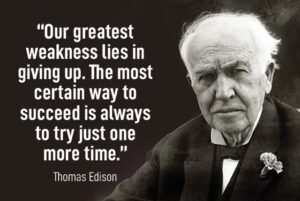How To Lose Weight Fast Losing weight is a common goal for many people, and it often leads to the temptation of trying fad diets that promise quick results. However, it is crucial to realize that losing weight too rapidly can have adverse effects on your body. Rapid weight loss can lead to muscle loss instead of fat loss, which can slow down your metabolism and make it harder to maintain weight in the long run.It’s important to understand that healthy weight loss involves making sustainable lifestyle changes such as eating a balanced diet and engaging in regular physical activity. While there are ways to accelerate weight loss like increasing physical activity or reducing calorie intake, these changes should be gradual and sustainable. It’s also important to seek guidance from a healthcare professional or registered dietitian before embarking on any drastic dietary changes.
A sustainable approach that focuses on long-term habits will not only help you lose weight but also improve your overall health and well-being. Safe and sustainable weight loss requires patience, commitment, and expert guidance. Focus on making healthy lifestyle choices instead of just achieving a specific weight or deadline. Adopt a holistic approach by incorporating a balanced diet rich in whole foods and lean proteins, reducing processed foods and sugar intake. Regular exercise, including both cardiovascular and strength training, is crucial. Good sleep hygiene and stress management also support healthy habits. Remember, sustainable weight loss involves realistic lifestyle changes for improved overall health and well-being.
Outlines Of Guide
Toggle15 Tips for Safe and Sustainable Weight Loss, According to Experts
1. Implement Long-Term Lifestyle and Behavior Changes
Albertson recommends avoiding the term “diet” when attempting to lose weight. Dieting can be unpleasant and lead to hunger, causing constant thoughts about food, which is counterproductive when aiming to lose weight. Instead, she suggests viewing weight loss as a component of overall health improvement and prioritizing body care.
According to Albertson, weight loss is a complex process and it’s not entirely within your control to determine the number on the scale. However, you can take charge of other factors that affect your weight such as diet, exercise, sleep, and stress levels. To achieve your desired weight loss goals, it is recommended that you set specific, measurable, achievable, relevant and time-bound (SMART) goals and reward yourself when you achieve them. By focusing on these controllable factors and setting realistic goals, you can create a sustainable weight loss plan that will help you achieve long-term success.
2. Focus on the First 5% to 10%
Shifting your focus from the daunting task of losing a significant amount of weight to the potential health benefits that come with even modest weight loss can be a game-changer. Research shows that losing just 5-10% of your body weight can lead to significant improvements in blood pressure, cholesterol levels, and blood sugar control. Additionally, weight loss can improve sleep quality, reduce joint pain, and lower the risk of chronic diseases such as heart disease and diabetes. By shifting your mindset from solely focusing on the number on the scale to the positive impact on your overall health, you can set achievable goals and improve your wellbeing in the long run.
According to Bennett, setting smaller and achievable targets can do wonders for your health. Losing just 5-10% of your total body weight (TBW) can significantly enhance your well-being and reduce the risk of diseases like type 2 diabetes, stroke, cardiovascular disease, and certain types of cancer. This is because even modest weight loss has been shown to improve blood sugar levels, reduce blood pressure, and lower cholesterol levels. By taking small steps towards a healthier lifestyle, you can reap the benefits of improved health and longevity.
3. Reduce Your Intake of Ultra-Processed Carbs and Sweets
A study published in the Journal of the American Medical Association indicates that the key factor for weight loss is the type of food you consume. You can shed pounds more rapidly by enhancing the nutritional value of the foods you eat. Bennett suggests that one of the best ways to lose weight healthily is by decreasing the consumption of sugar and quickly metabolized carbohydrates. It is especially important to limit high-glycemic-load foods, like sweet snacks, processed carbohydrates, and sugary drinks. By reducing or eliminating foods such as French fries, chips, and crackers, you can accelerate your weight loss.
4. Eat More Plants
Studies indicate that a diet based on plants not only facilitates weight loss but is also more sustainable than a low-calorie diet. Additionally, it is rich in nutrients and offers multiple health advantages. According to Albertson, produce aids in weight loss as it is high in fiber and water, both of which are calorie-free and fill up the stomach, promoting a feeling of fullness. Additionally, a study conducted in Brazil discovered a clear link between higher intake of fruits and vegetables and improved weight loss.
Albertson recommends starting with five daily servings of fruits and vegetables and gradually increasing to seven to nine servings per day. She advises beginning the day with a green smoothie, consuming salads or vegetables with lunch, having fruits as snacks and desserts, and incorporating more vegetables into dinner meals.
- World’s first hand-held, portable device to accurately measure metabolism
- Scientifically proven to meet the gold standard of metabolism measurement (RER)
- See how your metabolism is affected by your nutrition, physical activity and sleep
- Achieve sustainable weight loss with daily personalized meal plans
- $299 plus $19/mo, includes one free month of membership
5. Pump Up Your Protein
Boosting your protein intake can aid in curbing appetite and preventing muscle mass loss. Dr. Albertson recommends consuming approximately 25 to 30 grams of protein, equivalent to two scoops of protein powder or 4 ounces of chicken breast, in each meal to enhance appetite control and weight management. It is advised to include one serving of high-quality protein in every meal for best results.
Albertson also states that women over 50 require a higher amount of protein (1 to 1.5 grams per kilogram of body weight daily) compared to men and younger women (who need .8 grams of protein per kilogram of body weight daily). She explains that women require more protein after 50, particularly as they near menopause, due to a reduction in estrogen hormone leading to a decline in skeletal muscle mass, strength, and regenerative ability.
6. Drink More Water
Studies indicate that consuming increased amounts of water is linked to losing weight regardless of diet and exercise. Sufficient water consumption can enhance feelings of fullness and reduce the desire for sugary foods. Additionally, water plays a crucial role in lipolysis, the body’s fat-burning process.
Florida-based celebrity trainer Jordan Morello, who works for the fitness platform Sweat Factor, recommends following the eight by eight rule, which entails consuming 8 ounces of water eight times throughout the day as a minimum water intake suggestion. He notes that many of his clients are surprised by how much this simple practice can reduce cravings and keep them feeling satisfied throughout the day once they incorporate it into their routine. Looking for another water hack? Consider drinking two cups of water before every meal. Research indicates that this simple practice can enhance weight loss.
7. Eat a Well-Rounded Breakfast
Attention to all those who skip breakfast! If you’re aiming to shed some pounds, cutting back on morning nourishment is not the solution. Research consistently indicates that skipping breakfast is linked to being overweight and obese. In addition, research published in the Proceedings of the Nutrition Society revealed that individuals who skip breakfast generally have lower quality diets and lack essential nutrients like vitamin D, calcium, and iron.
However, it’s important to note that not every breakfast will suffice. According to Bennett, in order to enhance cognitive function, improve productivity, and maintain better moods, it’s essential to consume a balanced breakfast that regulates blood sugar levels and includes sufficient protein, healthy fats, and high-quality carbohydrates such as fresh berries.
8. Stand Up and Move More
Losing weight can be made easier by increasing your non-exercise activity thermogenesis (NEAT), which refers to the energy used for all activities apart from eating, sleeping, and formal exercise. Simple changes such as carrying groceries, parking farther away, using the stairs, or fidgeting can result in burning hundreds of additional calories. Attempt to spend more time standing than sitting. Research indicates that substituting sitting with standing results in increased daily energy usage, leading to higher calorie burn and ultimately weight loss.
For instance, if you weigh 160 pounds and switch between sitting and standing, you can expend around 35 extra calories per hour—equivalent to 280 additional calories per day, 1,400 calories per week, and approximately 70,000 calories per year. “Albertson suggests setting a timer on your phone, Fitbit, or computer to prompt you to stand up and take a break every hour. This can help you burn more calories and potentially reduce your blood sugar levels and risk of heart disease.”
9. Hit the Weights
Building muscle requires strength training, as muscle burns more calories than fat. Incorporating resistance training into your weight loss strategy is a wise decision, not only due to the calories burned during the workout, but also because of the “afterburn effect.” Referred to as excess post-exercise oxygen consumption (EPOC), this phenomenon indicates the duration for which oxygen intake remains heightened after exercise to aid in muscle recovery. This heightened oxygen intake increases metabolism during and after strength training sessions.
As you increase your muscle mass, your resting metabolic rate (RMR) also increases. Your RMR is responsible for the number of calories your body requires at rest. A higher RMR allows you to consume more calories without gaining weight. Albertson emphasizes the importance of strength training for weight loss and weight maintenance, particularly for individuals over 50, as muscle mass decreases with age, resulting in a decline in calorie-burning capacity.
- Formulated with science-based clinically tested ingredients to help make the weight-loss process easier and more efficient
- Includes 300mg green tea leaf extract, 250mg Forslean, 125mg natural caffeine, 125mg L-Theanine, 50mg Capsimax and 5mg Bioperine per serving
- Supports basal metabolic rate, promotes energy and focus, and reduces hunger cravings
- Gluten-free, Non-GMO, no artificial sweeteners or colors
- Contains 120 capsules per bottle
10. Don’t Go Overboard
Overly reducing calories or exercising constantly can actually have the opposite effect on weight loss. Many believe that extreme measures are necessary to lose weight, but giving yourself sufficient time to recover is more effective. Certified personal trainer Rob Darnbrough, CEO and co-founder of The Smart Fit Method in California, explains that many people tend to intensify their efforts when they are frustrated about not losing weight. This often involves increasing their physical activity and decreasing food intake. However, the desired results actually occur during the anabolic recovery phase, not the catabolic phase.
During the anabolic phase, the body builds muscle and decreases fat mass while recuperating from stress, as stated by Darnbrough. Instead of pushing to exhaustion, which can lead to overtraining and diminished results, it’s crucial to give equal importance to rest and nutrition alongside your workouts. Darnbrough suggests maintaining a balanced stress-to-recovery ratio for long-lasting outcomes.
11. Check in With an Accountability Partner
Sometimes losing weight can feel lonely, but you don’t have to do it all by yourself. Studies indicate that accountability is effective. In a particular research study, 66% of individuals who participated in a weight loss program with friends sustained their weight loss for six months after the meetings concluded, in contrast to only 25% of those who attended alone. Many organizations recommend having a sponsor or champion to support your weight loss journey.
Bennett recommends that a reliable method for maintaining a healthy diet and steadily losing weight is to regularly connect with an accountability partner. This person does not have to be your best friend, favorite colleague, or romantic partner. Simply find someone who shares similar weight loss objectives. It’s not necessary to communicate every day – just send each other a quick text to confirm that you’re making healthy food choices and sticking to your plan. If you feel tempted by unhealthy foods, you can also rely on your partner for support, especially when you need to resist the temptation.
12. Watch Less Television
Individuals who engage in couch surfing and aim to shed weight should consider turning off the television, as studies indicate that the more television a person watches, the more weight they tend to gain. A study gathering information from over 50,000 middle-aged women across six years revealed that every two hours of daily television viewing was associated with a 23% increased risk of obesity and a 14% increased risk of diabetes. Watching too much television is linked to weight gain mainly because it involves sitting still and often leads to mindless snacking. Therefore, consider switching it off or tuning into an exercise program instead.
13. Reconnect With Your Satiety Cues
When it comes to unconscious eating, you can reset your mind to promote weight loss by reconnecting with your body’s innate signals for hunger and fullness. “Eating while busy or distracted, such as while driving or using electronic devices, can disrupt your ability to recognize when you’re hungry or full,” Albertson explains. “Additionally, many of us were taught to finish everything on our plates rather than stopping when we’re no longer hungry. When you factor in the substantial increase in portion sizes—up to 60% for snacks, for example—the outcome is ongoing overeating.” Albertson recommends eating when hungry and stopping when satisfied instead of stuffed. Rather than monitoring your food, try tracking your hunger levels before, during, and after meals to reconnect with your body’s signals.
14. Get More Sleep
Ensuring you get a sufficient amount of sleep each night is crucial for both maintaining a healthy weight and overall well-being, as research indicates a link between inadequate sleep and weight gain, as well as other health issues. A study of 68,183 middle-aged American women over 16 years revealed that those who slept for five hours or less each night had a 15% higher risk of obesity compared to those who slept for seven hours.
Inadequate sleep can impact the release of appetite-controlling hormones ghrelin and leptin, causing individuals to experience increased hunger during the day. Moreover, lack of sleep raises cortisol levels, leading to greater difficulty in losing body and abdominal fat. Darnbrough advises that while we may not have control over our wake-up time, we can control our bedtime. He suggests counting back seven to nine hours from the wake-up time. Additionally, he promotes the 3-2-1 rule: stop working three hours before bed, stop eating two hours before bed, and stop digital stimuli one hour before bed to enhance deep sleep and REM.
15. Find Non-Edible Substitutes for Self-Soothing
“Comfort food” is named as such for a reason, but emotional eating can easily sabotage any attempts to lose weight. Albertson suggests that instead of turning to food to feel better when stressed, which increases cortisol levels and triggers the release of dopamine, one should raise oxytocin levels through soothing touch, playing with a pet, or getting a hug.
Animal research has shown that oxytocin decreases calorie intake and has beneficial impacts on metabolism. A limited human study also discovered that administering oxytocin to men for eight weeks resulted in weight loss. Albertson suggests that while further research is necessary to fully comprehend the effects of increased oxytocin on weight and appetite, practicing self-compassion during difficult emotions can help reduce the likelihood of overeating. He recommends using the acronym ‘HALT’ – hungry, angry/anxious, lonely, and tired – to assess whether the urge to eat is driven by physiological hunger or emotional needs. If not hungry, food may not be the solution.
How Much Do Dental Implants Cost In 2025?
Why Losing Weight Fast Isn’t the Best Goal
While the temptation of the “lose 5 pounds in a week” diet myth is appealing, there are numerous reasons why rapid weight loss may hinder your overall weight loss progress. Initially, individuals who experience rapid weight loss, particularly through fad or crash diets, often struggle to sustain it as the weight lost usually consists of more muscle mass and water, and less fat mass, in comparison to those who lose weight slowly.
Certified health coach and author of Sugar Shock and Beyond Sugar Shock, Connie Bennett, emphasizes the significance of preserving lean muscle during weight loss. Muscle plays a crucial role in metabolism and helps in burning more calories. However, rapid weight loss results in muscle loss and a decrease in calorie burning, potentially leading to permanent slowing of metabolism.
Swift weight reduction frequently results in the undesirable cycle of weight fluctuation that many persistent dieters go through. Research on past participants of NBC’s “The Biggest Loser” show revealed that the more pounds they shed rapidly, the more their metabolism decelerated. The study also indicated that the contestants regained a significant portion of their lost weight over the six years after the competition.
A study conducted in Australia and published in The Lancet involved 200 participants and revealed that although the dieters in the study lost the same amount of weight, the group that experienced gradual weight loss lost 10% more body fat and 50% less lean muscle compared to the group that lost weight rapidly. Adding to the problem, rapid weight loss often leads to an increase in appetite and a decrease in metabolism, making it extremely challenging to maintain weight loss. Research published in Obesity indicates that our bodies signal us to consume an extra 100 calories per day for each pound lost.
Frequently, trendy diets can lead to lacking essential nutrients. According to registered dietitian Ellen Albertson, Ph.D., rapid weight loss, particularly through carb reduction, is mostly water. In addition, low daily calorie intake can cause the body to use muscle mass as energy, leading to a decrease in metabolism since muscle mass is metabolically active. The key point is to lose weight in a sensible manner. It is commonly recommended by experts to aim for a safe weight loss of around half a pound to 2 pounds per week. With this objective in mind, here are some proven methods to lose weight and maintain long-term results.
How Long Does It Take to Lose Weight?
The Centers for Disease Control and Prevention (CDC) suggests a weight loss of 1 to 2 pounds per week. Furthermore, the CDC states that individuals who lose weight slowly are more likely to maintain their weight loss compared to those who lose weight quickly. The speed at which you can lose weight is influenced by various factors such as age, medical background, medication intake, sleep patterns, and genetics. Typically, a reduction of around 500 calories per day through diet or exercise is required to achieve a one-pound weekly weight loss.
The Benefits of Losing Weight Safely
Consider the various benefits of safely losing weight through healthy lifestyle adjustments such as better eating habits and increased exercise, including reduced body fat and improved joint pain.
- Maintain weight loss. The CDC states that individuals who lose weight slowly (1 to 2 pounds per week) by making lifestyle changes such as adopting healthy eating habits, engaging in regular exercise, and managing stress are more likely to maintain their weight loss compared to those who lose weight rapidly.
- Improve blood pressure, blood sugar and cholesterol.The American Heart Association (AHA) states that making lifestyle adjustments such as engaging in regular physical activity and consuming nutritious foods can decrease the likelihood of high blood pressure, high cholesterol, heart attacks, and strokes. Furthermore, adopting healthy habits to lose weight may also slow down the advancement of prediabetes and type 2 diabetes, or manage type 1 diabetes. Even a modest weight loss of 5% to 10% of one’s body weight can lead to enhancements in blood pressure and cholesterol levels.
- Lose more body fat. In a 2017 study published in the International Journal of Endocrinology and Metabolism, 42 individuals with excess weight or obesity were examined. The study found that participants who engaged in slow weight loss showed a greater reduction in body fat, as well as larger decreases in waist and hip circumference, compared to those who opted for rapid weight loss. Conversely, those who pursued rapid weight loss experienced greater losses in fat-free body mass, lean body mass, and total body water.
- Improvements in joint pain. Shedding weight can lessen the pressure on joints and the inflammation linked to weight gain. A loss of only 10 to 15 pounds could greatly lower the likelihood of developing osteoarthritis in the future and could enhance the seriousness of arthritis symptoms.
Potential Side Effects of Rapid Weight Loss
Losing more than 1 to 2 pounds per week can lead to side effects such as muscle loss, reduced body water, and lower bone density, and is typically not advisable. Additional side effects of quick weight loss may involve:
- Fatigue
- Diarrhea
- Constipation
- Nausea
- Gallstones
- Gout
Furthermore, individuals who experience rapid weight loss are at a higher risk of quickly regaining the weight. It is advisable to seek guidance from your healthcare provider in order to establish a safe weight loss plan.
Who Should Not Attempt to Lose Weight Fast?
It is not advisable to lose weight quickly as a safe and sustainable weight loss method. However, it is particularly important for children, teenagers, pregnant women, and older adults to be careful with rapid weight loss. Before beginning a weight loss diet or exercise plan, consult your doctor to find a safe and suitable weight loss method for your health requirements.
Final Words
Achieving sustainable weight loss involves making healthy lifestyle changes such as maintaining a balanced and nutritious diet, engaging in regular exercise, and effectively managing stress. People who lose weight gradually are more likely to maintain their weight loss and experience advantages such as decreased body fat, enhanced heart health, and more. In the meantime, individuals who shed pounds rapidly are at a higher risk of losing muscle and water weight, as well as facing potential side effects such as reduced bone density or weight re-gain. It is advisable to consult your doctor to find the most suitable weight loss strategy for your needs.
How To Lose Weight Fast 2025: Frequently Asked Questions
What is the fastest way to lose weight?
Reducing calorie intake and participating in consistent physical activity can result in steady and lasting weight reduction. Professionals advise aiming for a minimum of 150 minutes of exercise each week (or 30 minutes per day, five days a week) and consuming 500 fewer calories daily to achieve a potential loss of up to 1 pound per week.
What is the best diet to lose weight quickly?
An effective weight loss diet consists of natural, unprocessed foods such as fruits, vegetables, and lean meats such as poultry and fish.
How can I lose weight naturally in 7 days?
Increasing water intake, particularly before meals, and consuming a higher amount of fiber, can result in increased feelings of fullness after eating and could help in preventing overeating, potentially aiding in weight loss in the long run.
What’s the best way to lose belly fat quickly?
Studies suggest that gradual weight loss achieved through better dietary choices and more physical activity can result in decreases in body fat.
How many calories should I eat to lose weight?
Reducing daily calorie intake by 500 could result in a weekly weight loss of one pound. You can use a calorie calculator to establish your daily calorie target.










































